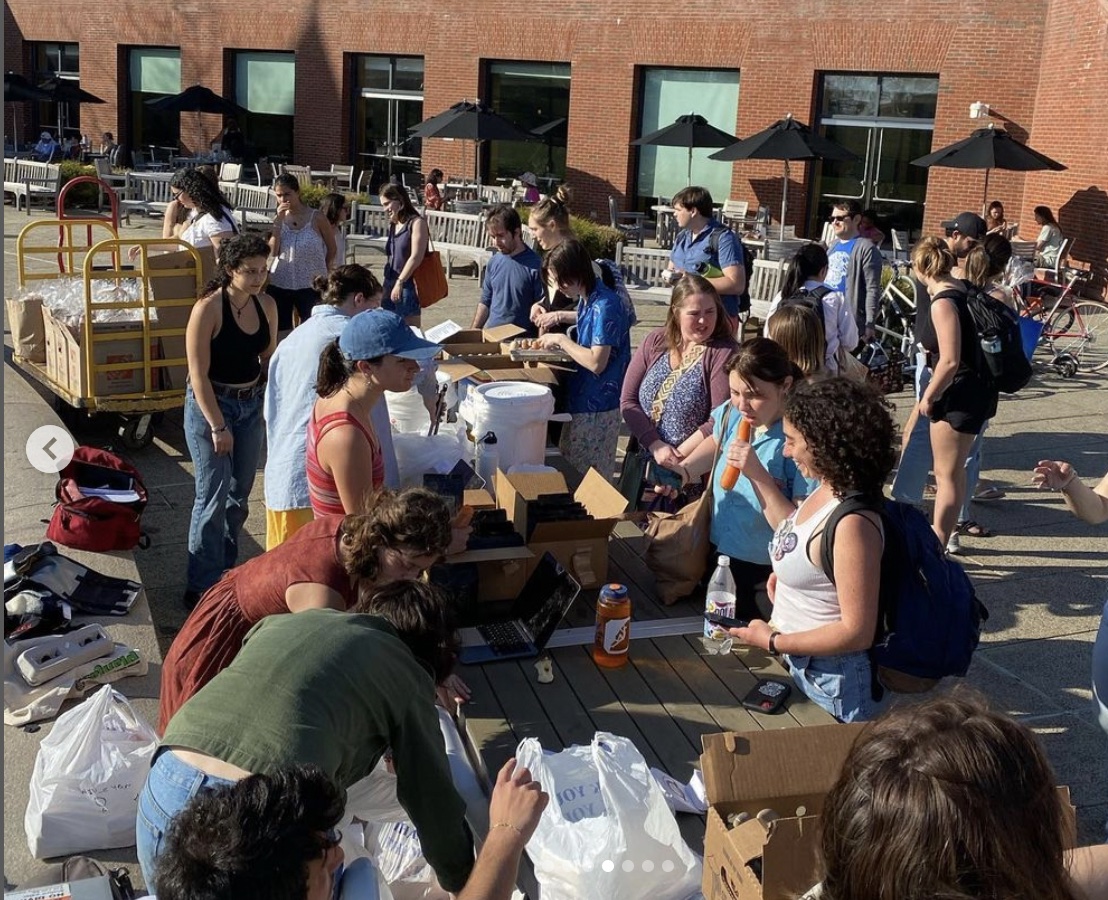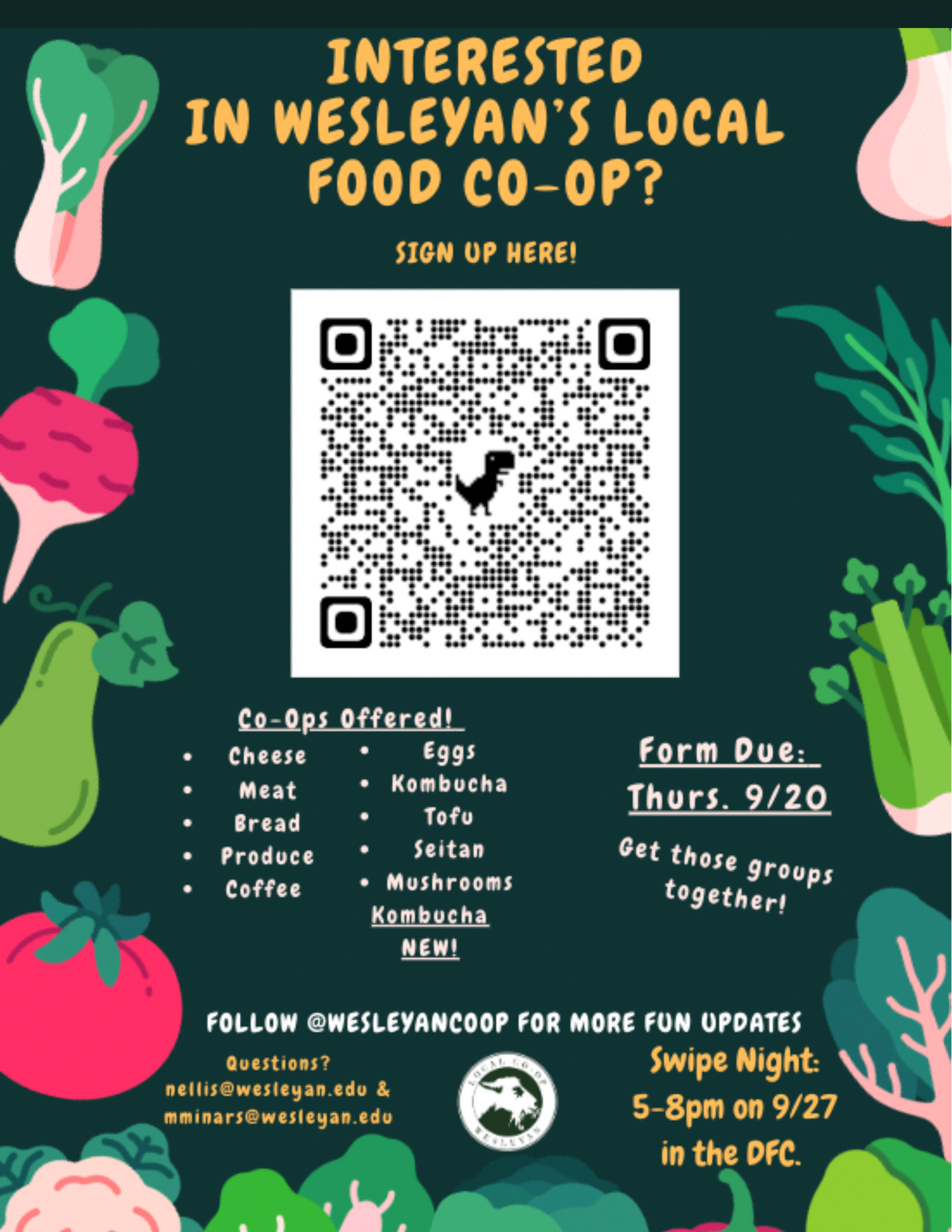
c/o Michael Minars
The student-led Wesleyan Local Food Cooperative (Co-op) is returning for its 12th year on campus, and the quickly approaching deadline to participate in this semester’s offerings is Wednesday, Sept. 20. In collaboration with the Sustainability Office and Bon Appétit (BonApp), Co-op aims to provide students with greater variety in their food options by partnering with local businesses to make their products available for convenient pick-up on campus.
Students wishing to participate in Co-op can opt into a cost-sharing model with a group of up to five other people. Together they select and purchase shares of bread, cheese, coffee, eggs, meat, mushrooms, produce, seitan, tofu, and, a new addition this year, kombucha. The program is primarily aimed at juniors and seniors because of their access to the All Declining Balance meal plan. Bon Appétit works with Co-op to allow students to use their meal points to cover the price.
During Swipe Night, which will be held this fall in the Daniel Family Commons on Wednesday, Sept. 27 from 5 p.m. to 8 p.m., students pay for the full semester’s worth of food shares. Most pay with points, but Co-op also accepts credit cards, cash, or checks.
The program was shut down during the COVID-19 pandemic due to concerns about health and safety. However, it has seen a resurgence over the last few years, particularly under the guidance of Cate Goodwin-Pierce ’25.
“I think that pause…gave the organization a chance to reflect on how we can do this better and was a wake-up call that Co-op is worth fighting for,” Goodwin-Pierce wrote in an email to The Argus. “Seeing the growth every semester is really exciting to me and has lit a fire, for all the leaders I think, to make Co-op work.”
Naomi Ellis ’25 and Michael Minars ’25 are leading Co-op this semester. Both have volunteered with Co-op in previous years and expressed excitement for the coming year and the opportunity to work together with vendors to create a community around sustainable food.
“People really like getting excited about food, and especially with fresh local seasonal food,” Ellis said. “And I think it’s so important for people to have that connection…it’s awesome. It’s fun. And it’s exciting. There’s so much learning that happens in the Co-op room.”
This year’s list of vendors includes Horse Listeners Orchard, Sweet Sage Bakery, Cato Corner Farm, The Bridge, Destination Coffee Roasters, Seacoast Mushrooms, Cold Spring Farm, and 860Kombucha. 860Kombucha— a family business committed to sustainability and supporting other small local Connecticut businesses—is a new addition to the list of vendors. The business derives its name from the area code for northeastern Connecticut and is excited to be introducing their product to a new audience.
“Our first batches that we are going to offer at Wesleyan are going to be two of our main flavors that we have all year,” 860Kombucha owner Michael Brannan said. “It’s ginger lemon lime and elderberry lemon lime. Both the ginger and the elderberry we get from [Fat Stone Farm] over in Lyme, Connecticut.”
Like 860Kombucha, all the vendors this year are small local businesses.
“Everything is local flavors, very seasonal, very tailored to order every week, whether you’re getting bread, coffee, cheese. You get to choose what you want,” Minars said. “Our bread is hot—it comes straight out of the oven. Our tofu is just being pressed…. Everything is very small business. And it’s just probably some of the best food you can get on campus.”

c/o Michael Minars
Co-op offers one of the most low-waste food options on campus, its organizers explained.
“All of our items (except for the meat and cheese obviously) are unpackaged and we recycle or reuse all the boxes that come to us,” Goodwin-Pierce wrote. “Co-op itself also doesn’t take any of the money, all of the money put into Co-op goes directly to the farmers and vendors after our fee to BonApp. So not only is Co-op providing good and environmentally friendly food to the campus, it also functions as a way to redistribute wealth and support local farmers that uphold our values in their practice.”
Beyond its practical environmental benefits, Co-op has also offered the surrounding community ways to engage with each other and the realities of sustainability in meaningful ways.
“Co-op has been such an awesome part of my college experience, (both as a volunteer and as a customer) so I really hope everyone has the chance to try it out,” Co-op volunteer Georgia Gerber ’24 wrote in an email to the Argus. “It is such a good opportunity to think about consuming mindfully, both physically and environmentally, and cooking/eating can be a real gateway for community building amongst housemates, friends, etc.”
Those interested in participating in Co-op this semester can sign up at this link: https://forms.gle/2xeqdqWNXygD8pXN7. The form closes at 11:59 p.m. on Wednesday, Sept. 20.
Rose Chen can be reached at rchen@wesleyan.edu.
Dove Bonjean-Alpert can be reached at dbonjeanalpa@wesleyan.edu.
Comments are closed